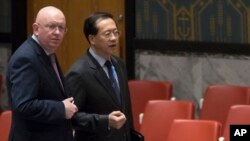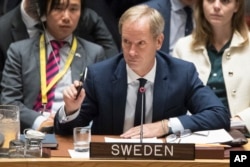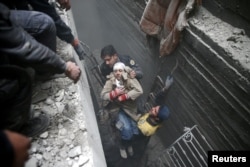The U.N. Security Council failed to reach consensus Friday on a draft resolution implementing a 30-day cease-fire across Syria and lift sieges on towns, and said they would reconvene Saturday to vote.
Council diplomats had planned to vote Friday morning, but twice postponed as negotiations to incorporate Russian concerns and amendments into the text dragged on without agreement.
“We have been close, but not able to close the gap completely,” said Swedish Ambassador Olof Skoog, who is leading the negotiations with his Kuwaiti counterpart.
"Look, I think we all agree that there needs to be a cease-fire. That has to be urgent, immediately. There is still some discussions on exactly how to define that. So that's what we're working on," Skoog added.
A visibly frustrated and weary Skoog said they would not give up because the situation on the ground demands a cease-fire. He said work would continue and the council would reconvene at noon New York time on Saturday and vote.
"I am trying to facilitate a meaningful outcome of this Security Council [effort] so I can only protect what we're trying to do and that is to have a resolution adopted yesterday. Now, we have not achieved that. I find that extremely frustrating given what we are faced with on the ground and I'm just saying that we're working on it and we're not giving up and I hope that we will adopt something forceful, meaningful, impactful tomorrow."
U.S. Ambassador Nikki Haley, who was not present at Friday’s negotiations, tweeted, “Unbelievable that Russia is stalling a vote on a cease-fire allowing humanitarian access in Syria. How many more people will die before the Security Council agrees to take up this vote? Let’s do this tonight. The Syrian people can't wait.”
The joint Swedish-Kuwaiti effort demands at least a 30-day cessation of hostilities to allow in aid and evacuate the critically ill and injured. It also calls for the lifting of sieges in four specific locations, including eastern Ghouta.
“We are working on it, and we are not giving up,” Skoog told reporters. “I hope we will adopt something forceful, meaningful, impactful tomorrow.”
“We are so close,” council president Kuwaiti Ambassador Mansour al-Otaibi told reporters. “We are working to have a consensus draft resolution.”
He said the main sticking point was over language in the first operating paragraph of the draft, which says the truce would not apply to terrorist groups including the Islamic State, al-Qaida and the Nusrah Front.
Russia has pressed for language that adds “associated” groups and entities to that wording, but other members have resisted out of concern as to how broadly that could be interpreted. For instance, Russia regards the civil society first responders the White Helmets as having links to terrorists, whereas most other countries strongly disagree.
The 10 elected members of the council expressed their unity earlier in the day for the need to quickly adopt and implement the cease-fire, standing publicly together outside the Security Council to support it.
“We've really taken our responsibility,” Dutch Ambassador Karel van Oosterom told reporters of the elected members. “We've tried to cross the bridge of the different interests that are there.”
Meanwhile, Syrian government warplanes supported by Russia pounded the rebel-held enclave of eastern Ghouta for a seventh straight day Saturday, killing at least three people, opposition activists and a war monitor reported.
Fighting has escalated there as the Syrian military and its allied forces appear to be launching an all-out operation to re-take the area, which is one of the last near Damascus still under control of the armed opposition.






